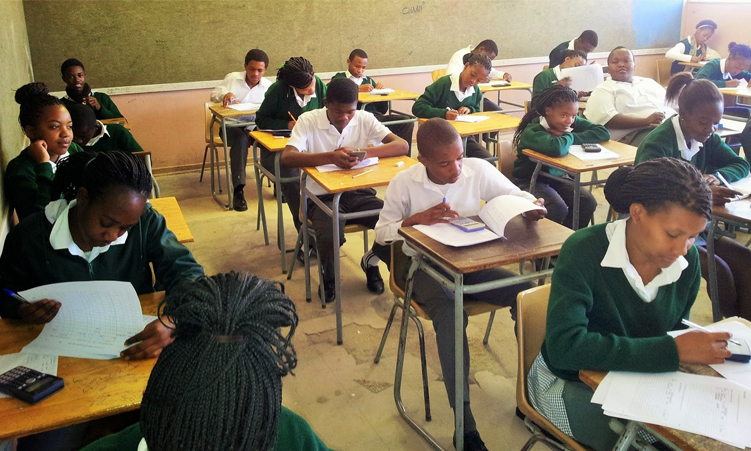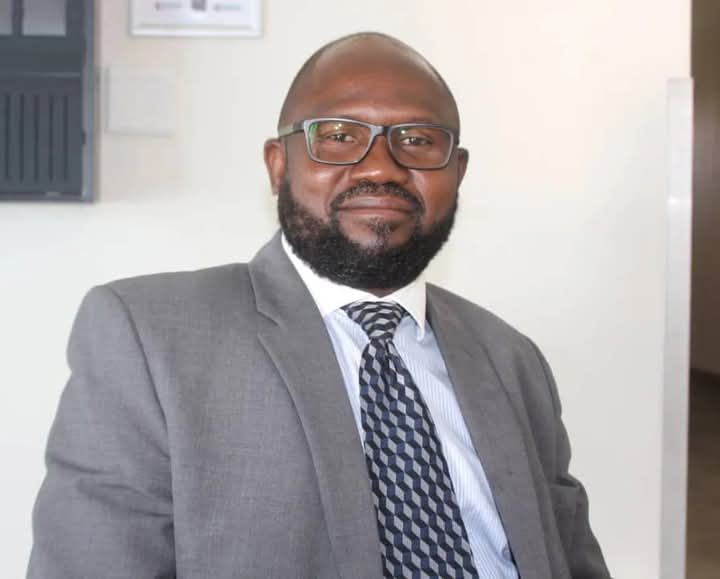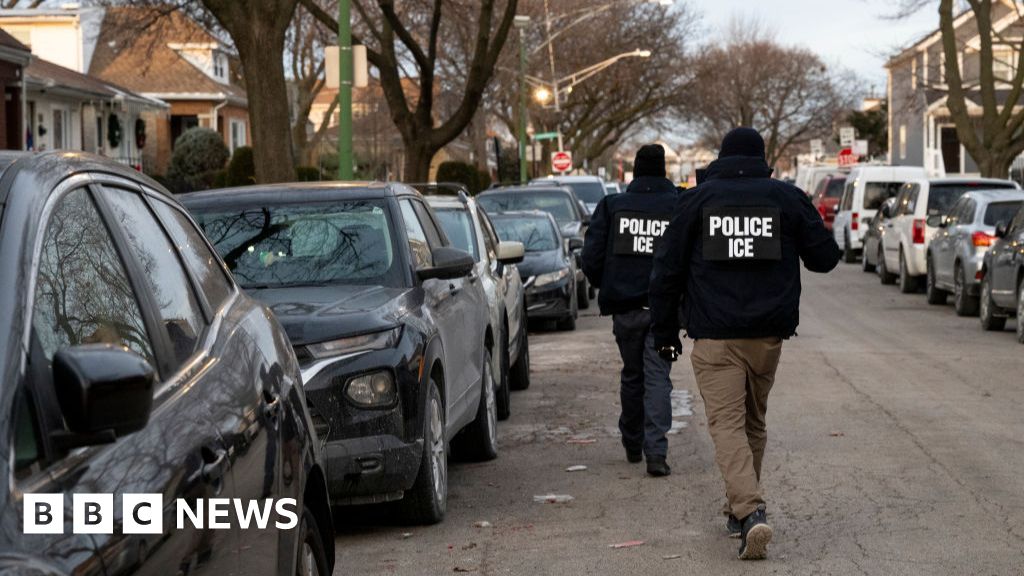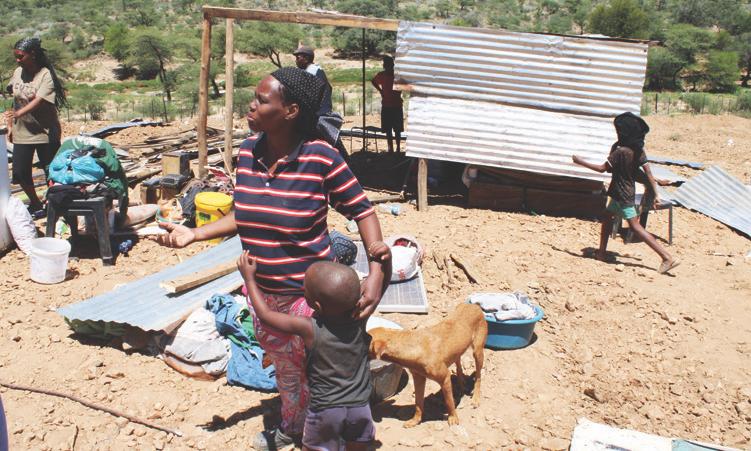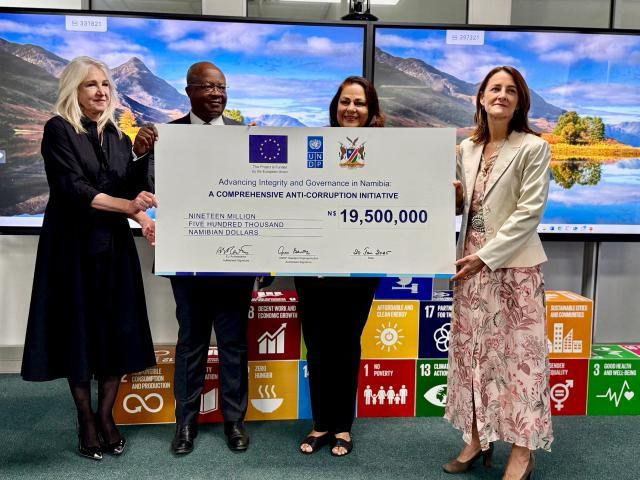More than 28 700 pupils who sat for their final examinations last year will not progress to the advanced subsidiary level or university this year after failing to attain the necessary grades.
This is out of 40 757 pupils who wrote the Namibia Senior Secondary Certificate Ordinary (NSSCO) examination last year.
Minister of education, arts and culture Anna Nghipondoka yesterday said out of those who wrote ordinary level examinations, 12 031, or 29.5%, qualified.
This represents a 4 percentage point improvement from the 25.2% qualification rate in 2023.
Since 2020, when 18.5% of pupils who wrote ordinary level examinations qualified, there has been a steady increase in the percentage of pupils qualifying for Grade 12 or universities – 11 percentage points.
“There has been a consistent rise of candidates qualifying for advanced subsidiary level in our schools, reflecting positive progress. This clearly shows improvement in our education system, offering optimism for the future,” Nghipondoka said.
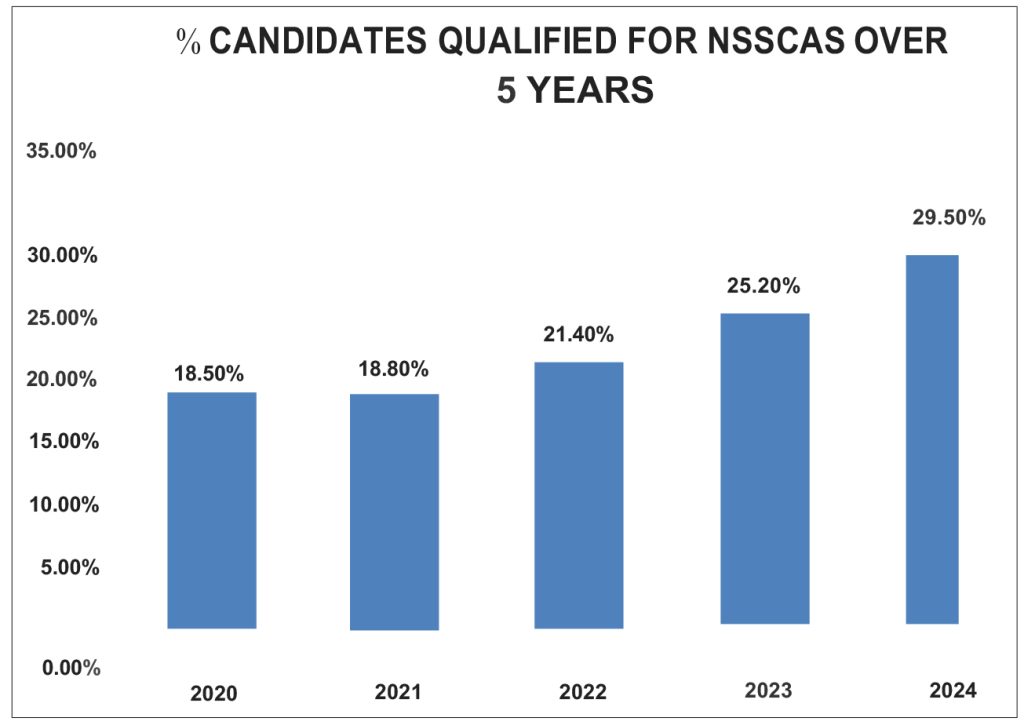
BETTER PLANNING
The education ministry’s executive director, Sanet Steenkamp, criticised schools for a lack of planning after the ministry increased budgetary allocations for stationery and hygienic needs.
“We are still faced with a situation where we did not plan and execute in the manner that we should have. We were not transparent in how we used the subsidies. We were not open about the budgets at the schools,” she said.
She advised schools to regularly monitor their ongoing operations and ensure smooth procurement processes.
“If I had six months to procure either furniture .. [or] stationery, and it did not happen, if textbooks are still being delivered by one supplier who keeps keeping us back, then it means we did not execute to serve the Namibian nation,” Steenkamp said.
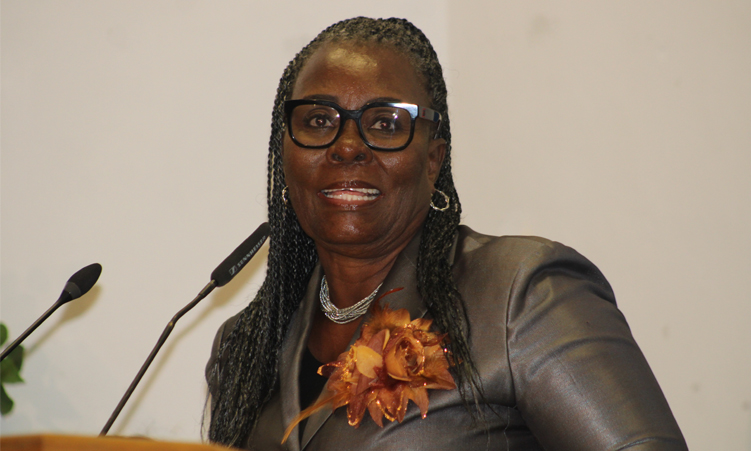
BEST PERFORMING
The Rukonga Vision School in the Kavango East region, scooped the top three positions in the NSSCO examinations, maintaining their record (achieved in 2023) as the nation’s best school.
These pupils are Jolisa Garises (first), Tangeniomwene Ingashipua (second) and Trinity /Oxurus (third).
The fourth best pupil is Martha Uuyuni from Canisianum Roman Catholic High School in the Omusati region, and the fifth is Jacob Iipinge, also from Rukonga Vision School.
The best performing public schools are Rukonga Vision School, Onawa Senior Secondary School (Omusati region), and Ruacana Vocational Secondary School (Omusati), which was in 16th place last year.
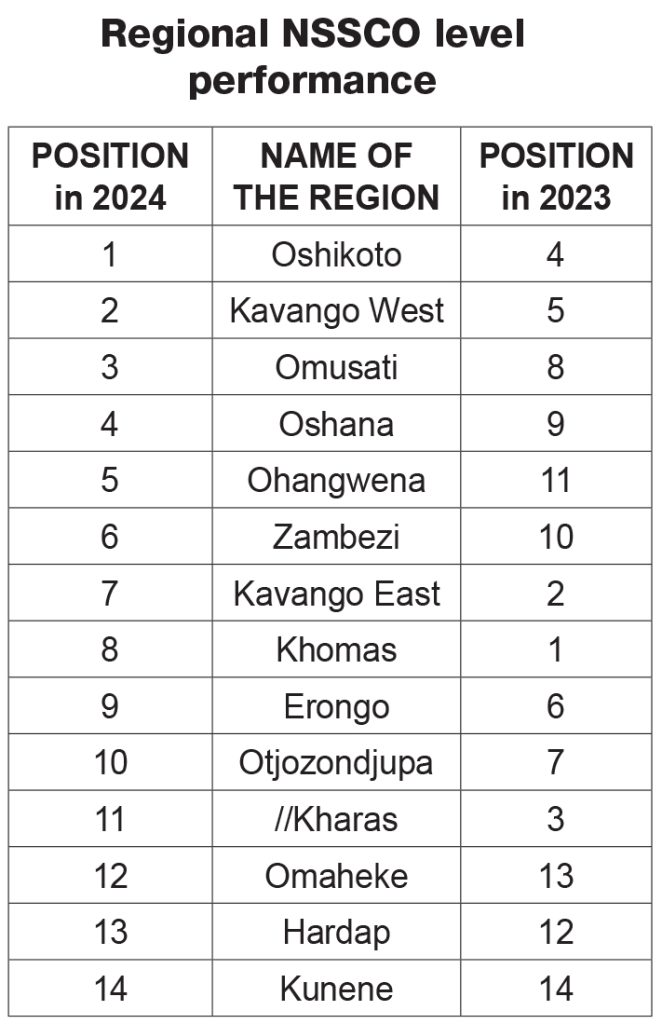
The regions topping the performance list this year are (in order): Oshikoto, Kavango West, Omusati, Oshana and Ohangwena.
For the NSSCO examinations, Nghipondoka said the commerce subjects saw an “excellent performance”. The national average – the average mark for all pupils who scored between an A symbol and a D symbol – increased from 43.6% to 53.3%.
The national average in science subjects was 48.7%. In the social science subjects, Nghipondoka said there is a positive trend. The national average of these subjects was 36.6%, up more than five percentage points from last year’s 31.1%.
“As a result, it is essential for teachers to integrate these higher-order thinking skills into their instruction,” she said.
Nghipondoka said there has been a decline in the performance of Afrikaans and English as second languages.
“Both subjects had a drop in the A to D average, with the national average falling from 70.2% to 58.9% in 2024,” the minister said.
She added that, conversely, the performance in African languages was excellent, with a national average of 88.1% across all nine languages compared to 83.5% in 2023.
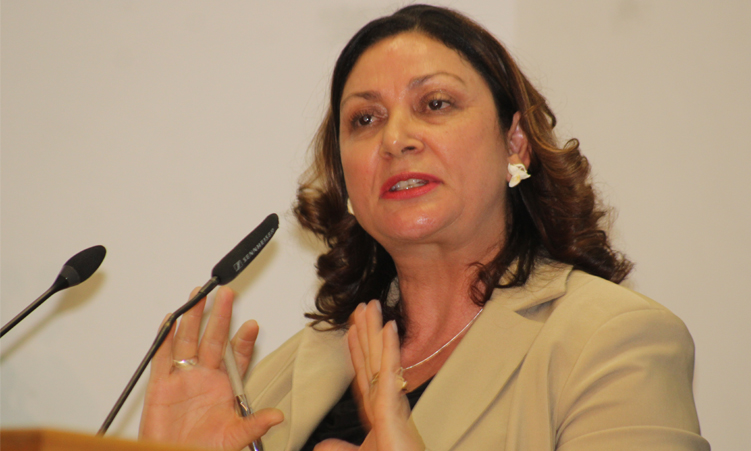
‘WEAK RESULTS’
National Unity Democratic Organisation (Nudo) secretary general Joseph Kauandenge yesterday labelled the results as mediocre.
“We must never celebrate mediocrity. There is nothing really to celebrate here, as the usual yearly story of dumping young people on the streets continues unabated,” he said.
He further emphasised that those who praise this performance have failed the pupils.
“We must be a very sick society really to celebrate this kind of poor performance. The difference is a mere four [percentage points] and yet the way the minister (Anna Nghipondoka) and her team celebrate shows that they have failed our education system terribly,” the Nudo lawmaker said.
“I must say there is a need to go back to the basics and reevaluate our education system, as the current one continues to show inadequacy, and at best is out of touch with the needs and wants of our students,” Kauandenge said.
The Namibia Economic Freedom Fighters (NEFF) questioned whether the ministry can see the fault of the low passing rate.
“Where do they see the fault of how, out of [more than 40 000 pupils], it’s not even half of the pupils that qualify?” asked NEFF spokesperson Teresia Hamurenge.

Hamurenge yesterday probed whether the lack of resources explain the low qualifying rate. “Without the resources, how will the majority pass?” Hamurenge questioned.
“And when they prepare the examinations, who is actually preparing them whereby the pupils end up failing?” she added.
Landless People’s Movement lawmaker Utaara Mootu yesterday said highlighting increases in national averages is a smokescreen, obscuring the fact that 70.5% of pupils failed to qualify for advanced studies.
“These pupils face uncertain futures within a system that provides little to no viable alternatives, placing them under circumstances of limited access to further education, employment or vocational training,” she said.
Mootu argued that the education system eventually puts pupils at risk of becoming part of a growing population of unemployed and unskilled youth. “If swift action is not taken in the long term, these pupils are on the brink of facing various social ills,” she said.
The Trade Union Congress of Namibia’s secretary general, Mahongora Kavihuha, yesterday said the education ministry needs to hire better teachers to improve school performance.
He also highlighted the lack of resources as a challenge, noting that many schools are struggling because classrooms are overcrowded.
“As a former teacher in Khomas and rural areas, I understand this problem well,” he said.
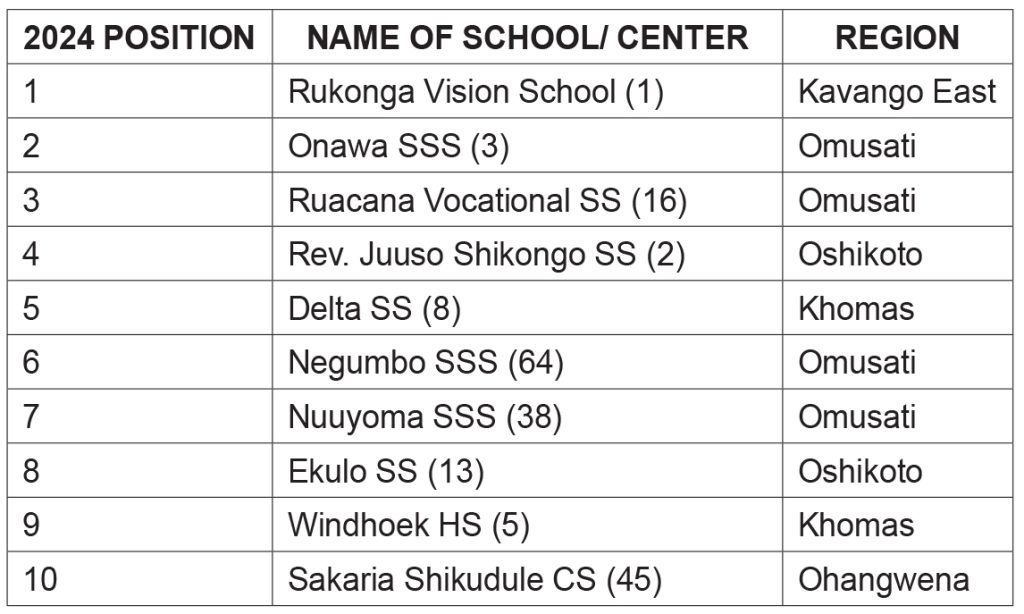
Stay informed with The Namibian – your source for credible journalism. Get in-depth reporting and opinions for
only N$85 a month. Invest in journalism, invest in democracy –
Subscribe Now!



